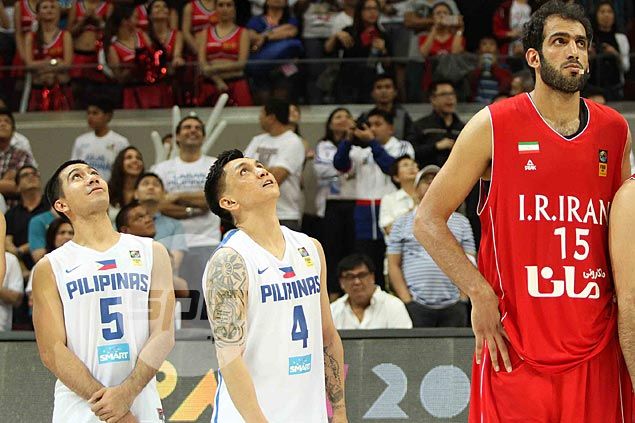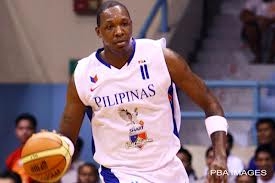depende ni chot, 12 ra bya jd ang kuhaon.
murag last year niya karon sa AdMU. HEHE!
maglagot ko magbasa sa uban forums ba, maynta daw tangtangon si Fajardo sa GILAS ig.fiba world cup sa spain kay mao daw makapa.bad image sa PILIPINAS, kay abi palang sa mga taw ang mga taga Pilipinas kay bati ug nawng kaay naa si FAJARDO ang kapre. tsk3! mosugot mo ana na in.anaon ila atong kababayan nga si FAJARDO? tsk3!
Results 821 to 830 of 896
-
08-13-2013, 04:52 PM #821
-
08-13-2013, 05:08 PM #822
-
08-13-2013, 07:42 PM #823
World Cup: ‘Pinoys need more size’
THERE’S no better advice Gilas Pilipinas received on its coming trip to the Fiba World Cup in Spain next year than from the one who had experienced it first hand.
Iran’s Slovenian coach Mehmed Becirovic said that Gilas Pilipinas would need two to three more big men to get a fighting chance in the world championship.
“They (Filipinos) need size, that’s for sure,” said Becirovic, after the Iranians roughed up Gilas Pilipinas, 85-71, in the gold-medal match of the 27th Fiba Asia Championship on Sunday night at Mall of Asia Arena.
“They will need two to three more men who could defend and score inside,” he added.
The world championship is not unfamiliar ground to Becirovic, who led Slovenia to eighth place (five wins, four losses) in the 2010 Fiba World Championship in Istanbul.
With Becirovic at the helm, Slovenia beat Tunisia, Croatia, Brazil, Iran and Australia. The losses came from Turkey, Spain, Russia and NBA-powered United States.
Asian countries Iran and China finished with 1-4 records in the previous worlds while Lebanon and Jordan lost all their five outings.
On Sunday, Iran frontliners Hamed Haddadi (7-2) and Ashgar Kardoust (6-9) hammered the Filipinos inside the paint while 6-foot-8 swingman Samad Bahrami and peppery guard Mahdi Kamrani combined to apply pressure each time Gilas mounted a comeback.
Gilas’ 6-10 center Marcus Douthit didn’t play due to an injury, forcing coach Chot Reyes to lean on 6-6 Ranidel de Ocampo and 6-4 Marc Pingris in the shaded area along with 6-9s Japeth Aguilar and Junmar Fajardo.
“(The Filipinos) cannot play this way in the world championship,” said Becirovic. “It’s an entirely different level. You can only play this way if you have a big crowd behind you.”
World Cup:
-
08-13-2013, 08:22 PM #824
Unofficial trailer but grabe goosebumps..
featured ang Gilas
See you in 2014 - FIBA Basketball World Cup 2014 - YouTube
-
08-13-2013, 10:15 PM #825
-
08-13-2013, 11:10 PM #826
With naturalization bro I guess as long as willing ang person ma naturalize then thats it heheheMVP is the SBP president, xa sad ang sponsor sa team. Hosting of the event alone cost 70 million, doesnt include pa the training, salary and the 7 digit bonus na gihatag nya sa players

-
08-14-2013, 08:30 AM #827
from UBP page..
Scouting Report:
Eto man lang ang posibleng makakalaban natin.
USA National Pool:
Guards – Russell Westbrook, James Harden,
Stephen Curry, Kyrie Irving, Derrick Rose,
Damian Lillard, Bradley Beal, Klay Thompson,
Gordon Hayward, John Wall, Jrue Holiday
Wings – Kevin Durant, Paul George, Kawhi
Leonard, Harrison Barnes, Andre Iguodala
Bigs – Kevin Love, Anthony Davis, Blake Griffin,
DeMarcus Cousins, Greg Monroe, Andre
Drummond, Kenneth Faried, Larry Sanders,
Derrick Favors, Ryan Anderson, Mike Conley
-USA Today
-
08-14-2013, 09:23 AM #828
-
08-14-2013, 09:27 AM #829
Kung USA lang ato kontra wala gyud ta chance, lisod man gani pagdaug sa Jones Cup ra mga non NBA players ra gani to, pero sa uban team murag naa gyud ta chance labi na kung magdugang ta ug naturalized, nya ibabad na maayo c Fajardo ky dako chance mainhance iya skills.
-
08-14-2013, 09:44 AM #830

HAHA!
Advertisement
Similar Threads |
|










